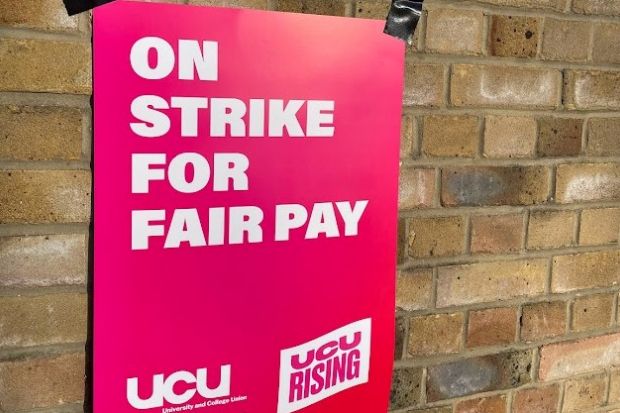A national marking boycott is having only a “limited” impact at UK universities despite reports of widespread disruption and cancelled graduation ceremonies, an employers’ body has claimed.
According to figures collected by the Universities and Colleges Employers Association (Ucea), released on 23 June, many students will be unaffected by the refusal of University and College Union (UCU) members to grade assignments and exams in recent weeks as part of a long-running dispute over pay.
Of the 49 per cent of universities involved in national pay negotiations that provided feedback to Ucea on the disruption caused by industrial action, 71 per cent said less than 2 per cent of students would be unable to graduate this summer, while a further 4 per cent of institutions said that between 2 per cent and 9 per cent of students would be affected.
About 20 per cent of institutions said they were unsure of the number of students affected because UCU had urged members not to inform employers of their intentions.
“Feedback confirming the limited impact of UCU’s marking and assessment boycott across the sector is little comfort to the students bearing the repercussions, nor for the HE institutions and the staff who are working tirelessly to try to help these students,” said Raj Jethwa, chief executive of Ucea.
However, UCU’s general secretary, Jo Grady, called on Ucea to “stop the truth-twisting and get back to the negotiating table with a better offer”.
Dr Grady added: “More than 5,000 students have already been told their degrees have been impacted, and we are still around a month away from most graduations. Ucea urgently needs to stop spinning and start trying to fix its national degree scandal before it gets even worse.”
The update comes amid patchy data from universities about how many students will be affected by the marking and assessment boycott. Last week the University of Cambridge told staff that about half of its 4,500 finalists, including entire subject cohorts, were unlikely to graduate this summer, while Queen’s University Belfast said 759 students would not graduate as planned.
However, other institutions claim the disruption is more limited. Newcastle University told Times Higher Education that exam boards were still sitting so it was “too early” to say how many students would be affected, but it was likely to be a “small proportion”.
The University of Southampton said graduation ceremonies would “take place as planned this summer”, although there was the “potential for a very small number of students to have a slight delay to their classification”. “If this were to happen they will be contacted directly, and will still graduate this July,” it added.
Durham University said 16 per cent of its academic staff had declared that they were taking part in the marking and assessment boycott, and “detailed university mitigations are in place to address the impact of the boycott”.
The University of Oxford said it was “working to minimise disruption, and in particular we are taking all reasonable steps to ensure no student is disadvantaged by delays in the marking of examinations and assessments”.
“The overwhelming majority of examinations and assessments are taking place as planned…[and] we expect most degree results to be released to students on schedule,” it added.
Meanwhile, Cardiff University vice-chancellor Colin Riordan issued a message on 23 June stating that staff faced two months of deductions if they continued to participate in the action. However, the university would not dock pay for “any action taken” in April, May and June if these staff confirmed by 26 June that they would resume marking duties and return all assessments fully marked by 3 July.
“Our students deserve our support as they make their way into their future lives, and we must find other ways to resolve our differences,” said Professor Riordan.
According to the latest Ucea poll, more than 80 per cent of universities had less than 10 per cent of academic staff taking part in the boycott, while many had less than 2 per cent of staff refusing to grade assessed work.
“There is simply no need for UCU’s leaders to try and pursue this boycott on some students when employers are at the table to negotiate, as they have been for months,” said Mr Jethwa.
However, Dr Grady said the Ucea’s data “account for less than half of the universities impacted and don’t include the impact on students in non-graduating years”.
“They also don’t acknowledge the absurd criteria institutions have created to bypass their normal academic standards – for example, the University of Nottingham’s default position is for students to graduate with ‘partial degrees’,” she said.
“Students aren’t graduating, staff aren’t being paid. Meanwhile, the employer body responsible for solving this mess is wasting its time issuing press releases.”




